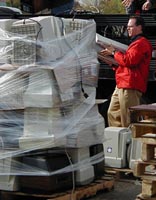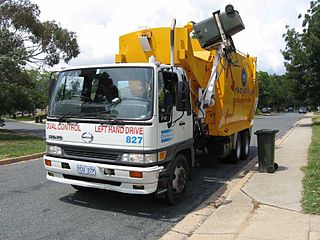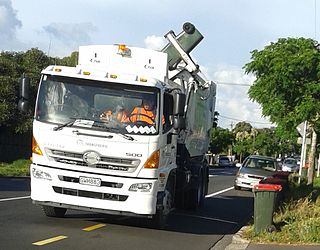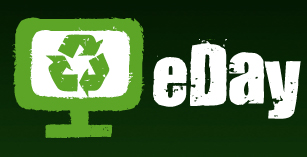
Computer recycling, electronic recycling or e-waste recycling is the disassembly and separation of components and raw materials of waste electronics. Although the procedures of re-use, donation and repair are not strictly recycling, these are other common sustainable ways to dispose of IT waste.

National Environment Agency (NEA) is a statutory board formed on 1 July 2002 under the Ministry of Sustainability and the Environment in Singapore.

Electronic waste or e-waste describes discarded electrical or electronic devices. Used electronics which are destined for refurbishment, reuse, resale, salvage recycling through material recovery, or disposal are also considered e-waste. Informal processing of e-waste in developing countries can lead to adverse human health effects and environmental pollution.

Kerbside collection or curbside collection is a service provided to households, typically in urban and suburban areas, of collecting and disposing of household waste and recyclables. It is usually accomplished by personnel using specially built vehicles to pick up household waste in containers that are acceptable to, or prescribed by, the municipality and are placed on the kerb.
Texas Campaign for the Environment (TCE) is a grassroots advocacy 501(c)(4) Non-profit organization that works on health and environmental issues in the state of Texas in the United States. TCE began when its founders parted ways with Texans United in 1991. The organization has offices in Dallas, Austin and Houston.
A landfill tax or levy is a form of tax that is applied in some countries to increase the cost of landfill. The tax is typically levied in units of currency per unit of weight or volume. The tax is in addition to the overall cost of landfill and forms a proportion of the gate fee.

Waste are unwanted or unusable materials. Waste is any substance which is discarded after primary use, or is worthless, defective and of no use. A by-product by contrast is a joint product of relatively minor economic value. A waste product may become a by-product, joint product or resource through an invention that raises a waste product's value above zero.

The environmental impact of paper is significant, which has led to changes in industry and behaviour at both business and personal levels. With the use of modern technology such as the printing press and the highly mechanized harvesting of wood, disposable paper became a relatively cheap commodity, which led to a high level of consumption and waste. The rise in global environmental issues such as air and water pollution, climate change, overflowing landfills and clearcutting have all lead to increased government regulations. There is now a trend towards sustainability in the pulp and paper industry as it moves to reduce clear cutting, water use, greenhouse gas emissions, fossil fuel consumption and clean up its impacts on local water supplies and air pollution.
Food waste in New Zealand is one of the many environmental issues that is being addressed by industry, individuals and government.

Municipal solid waste (MSW) – more commonly known as trash or garbage – consists of everyday items people use and then throw away, such as product packaging, grass clippings, furniture, clothing, bottles, food scraps and papers. In 2010, Americans generated about 250 million short tons (230 Mt) of trash. In the United States, landfills are regulated by the Environmental Protection Agency (EPA) and the states' environmental agencies. Municipal solid waste landfills (MSWLF) are required to be designed to protect the environment from contaminants that may be present in the solid waste stream.

The management of waste in New Zealand has become more regulated to reduce associated environmental issues.

Electronic waste or e-waste in the United States refers to electronic products that have reached the end of their operable lives, and the United States is beginning to address its waste problems with regulations at a state and federal level. Used electronics are the quickest-growing source of waste and can have serious health impacts. The United States is the world leader in producing the most e-waste, followed closely by China; both countries domestically recycle and export e-waste. Only recently has the United States begun to make an effort to start regulating where e-waste goes and how it is disposed of. There is also an economic factor that has an effect on where and how e-waste is disposed of. Electronics are the primary users of precious and special metals, retrieving those metals from electronics can be viewed as important as raw metals may become more scarce
Products made from a variety of materials can be recycled using a number of processes.

Mobile phones can be recycled at the end of their life.

Electronic waste in New Zealand is an environmental issue being addressed by community and government initiatives.

As a nation, Americans generate more waste than any other nation in the world, officially with 4.4 pounds (2.0 kg) of municipal solid waste (MSW) per person per day, with another study estimating 7.1 pounds (3.2 kg) per capita per day. Fifty five percent of this waste is contributed as residential garbage, while the remaining forty five percent of waste in the U.S.'s ‘waste stream' comes from manufacturing, retailing, and commercial trade in the U.S. economy. Based on proprietary data released to the public, Nevada was named America's "Most Wasteful State" for the years 2005-2010; where each resident threw away over 14 pounds of non-recycled, unreused items, often ending up into landfills and incinerators per day, eight pounds over the national state daily throwaway average. "Wasteful" states Michigan, New Mexico, Wisconsin and Oregon as well as Washington also dominated the list's 5-year period.
Pitsea waste management site is a large landfill site on the north side of the Thames estuary 0.7 miles (1.1 km) from Pitsea in Basildon, Essex. It is the second largest landfill site in the UK operated by Veolia Ltd. receiving 800,000 tonnes of solid waste per year, mostly from the London conurbation.

Taiwan has one of the most efficient recycling programs globally, with a 55% collection rate from households and businesses and a 77% collection rate from industrial wastes in 2019. Taiwan’s high recycling rates are unattainable in most countries due to Taiwanese geographical advantages along with efficient waste processing technologies and systems.

Waste management in South Korea involves waste generation reduction and ensuring maximum recycling of the waste. This includes the appropriate treatment, transport, and disposal of the collected waste. South Korea's Waste Management Law was established in 1986, replacing the Environmental Protection Law (1963) and the Filth and Cleaning Law (1973). This new law aimed to reduce general waste under the waste hierarchy in South Korea. This Waste Management Law imposed a volume-based waste fee system, effective for waste produced by both household and industrial activities.

South Korean waste disposal policy operates under the Ministry of Environment. Waste is required to be separated into four parts: landfill waste, organic waste, recyclable waste, and large waste items. Recyclable waste such as: paper, plastics and glass, should be separated before disposal. Fines are applicable to violations of the policy.
















